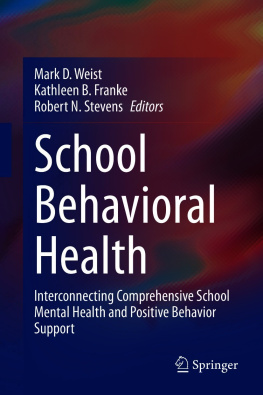
POSITIVE MENTAL HEALTH
This series of texts presents a modern and comprehensive set of evidence-based strategies for promoting positive mental health in educational settings. There is a growing prevalence of mental ill-health among the teaching profession within a context of funding cuts, strained services, constant change and an increasing workload. The series recognises the complexity of the issues involved, the vital role that teachers and leaders play, and the current education and health policy frameworks in order to provide practical guidance fully underpinned by the latest research.
Our titles are also available in a range of electronic formats. To order, or for details of our bulk discounts, please go to our website www.criticalpublishing.com or contact our distributor, NBN International, 10 Thornbury Road, Plymouth PL6 7PP, telephone 01752 202301 or email orders@nbninternational.com.

First published in 2020 by Critical Publishing Ltd
All rights reserved. No part of this publication may be reproduced, stored in a retrieval system, or transmitted in any form or by any means, electronic, mechanical, photocopying, recording or otherwise, without prior permission in writing from the publisher.
The authors have made every effort to ensure the accuracy of information contained in this publication, but assume no responsibility for any errors, inaccuracies, inconsistencies and omissions. Likewise, every effort has been made to contact copyright holders. If any copyright material has been reproduced unwittingly and without permission the Publisher will gladly receive information enabling them to rectify any error or omission in subsequent editions.
Copyright 2020 Jonathan Glazzard and Samuel Stones Photograph of Samuel Stones Emma Cronan
British Library Cataloguing in Publication Data
A CIP record for this book is available from the British Library
ISBN: 978-1-913063-01-6
This book is also available in the following e-book formats:
MOBI ISBN: 978-1-913063-02-3
EPUB ISBN: 978-1-913063-03-0
Adobe e-book ISBN: 978-1-913063-04-7
The rights of Jonathan Glazzard and Samuel Stones to be identified as the Authors of this work have been asserted by them in accordance with the Copyright, Design and Patents Act 1988.
Cover and text design by Out of House Limited
Project management by Newgen Publishing UK
Critical Publishing
3 Connaught Road
St Albans
AL3 5RX
www.criticalpublishing.com
Paper from responsible sources
CONTENTS
JONATHAN GLAZZARD 
Jonathan Glazzard is Professor of Inclusive Education at Leeds Beckett University. He is series editor for the Positive Mental Health series by Critical Publishing. Jonathans research explores issues of inclusion, exclusion, marginalisation, disability, sexuality and mental health for children and young people. He is a researcher, teacher, educator and author. Jonathans background is in primary teaching and he is a Trustee on several multi-academy trusts. | SAMUEL STONES 
Samuel Stones is a lecturer, researcher and doctoral scholarship student at Leeds Beckett University. He has co-authored texts for several publishers and has written extensively on inclusion and mental health. Samuels research explores issues of inclusion, exclusion, marginalisation, sexuality and mental health for children and young people. He is a senior examiner and experienced assessor and also holds a national training role with a large multi-academy trust. |

There is no doubt that being a school leader is a tough job. You are ultimately accountable for the decisions that you make and it is your responsibility to ensure that your school is effective. Of course, school effectiveness can be defined in different ways by various people. Interpretations of school effectiveness vary between individuals and groups and even across societies. In recent years, particularly in England and other countries across the world, there has been an emphasis on measuring school effectiveness on the basis of narrow academic performance indicators. In some schools this has led to pupils receiving a restricted curriculum which lacks breadth, depth and balance, and teaching that has been directed at driving up examination and test performance.
In England the school inspectorate body, the Office for Standards in Education (Ofsted), has recently revised the school inspection framework to include a greater emphasis on the quality of the school curriculum. The inspectorate has expressed concerns that the emphasis given in previous inspection frameworks to academic attainment has resulted in increased pressure on school leaders and a curriculum which lacks depth. The revised inspection framework consequently places the school curriculum at the heart of the quality of education provided by schools. The framework states that school leaders must:
construct a curriculum that is ambitious and designed to give all learners, particularly the most disadvantaged and those with special educational needs and/or disabilities (SEND) or high needs, the knowledge and cultural capital they need to succeed in life.
(Ofsted, , p 9)
Although many school leaders will welcome this change, modifications to the school inspection framework inevitably result in increased workload for school leaders. Leaders will need to revise school policies and practices to address all aspects of the revised inspection framework and this can result in significant increases to workload. In addition, changes to the examination system, measures of pupil progress and revisions to the national curriculum have all resulted in increased workload for school leaders in recent years. Although the education system needs to evolve to meet the needs of society, changes to broader education policy result in instability for school leaders as well as the need to abandon old systems, embrace the changes or risk potential failure. Cuts to school budgets in recent years have resulted in school leaders managing extremely tight budgets. The pressure on schools to join Multi-Academy Trusts has led to significant increases in workload for those schools that have relinquished local authority control. The emphasis on pupil academic performance in recent years has resulted in unethical practices, including off-rolling, extended internal exclusion and specific groups of pupils being disproportionally represented in permanent exclusion statistics. Although we do not support these practices, we recognise that the emphasis on narrow academic performance indicators in school inspections has largely contributed to their occurrence and consequently we welcome the changes outlined in the revised inspection framework.
Leading a school can be a lonely job. Although it is deeply rewarding to have the opportunity to impact on the lives of so many pupils, their families and community, it can also be isolating. Headteachers rarely receive praise, yet they spend a great deal of their time praising other people. School leaders may also have to spend disproportionate amounts of time supporting colleagues professionally and personally, particularly if personal issues start to detrimentally impact on their work. We would like to think that no school leader relishes having difficult conversations with colleagues and that their motivations for becoming a school leader are not related to power or status. Most school leaders have a clear moral purpose. They are motivated by having a wider impact on the life chances of pupils and wish to develop teachers to become the very best that they can be. However, sometimes it will be necessary to challenge colleagues and have difficult conversations, particularly in cases where practice is weak. This process can be just as stressful for school leaders as it is for the member of staff concerned and these situations can very quickly snowball, particularly if teaching unions become involved.















